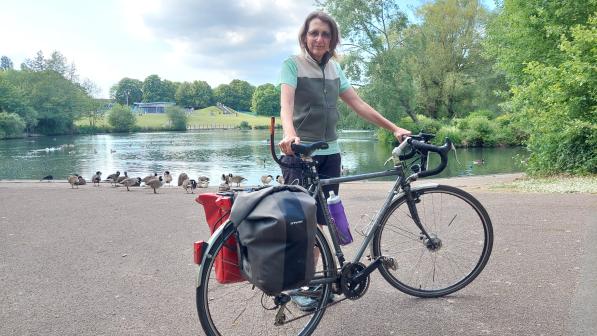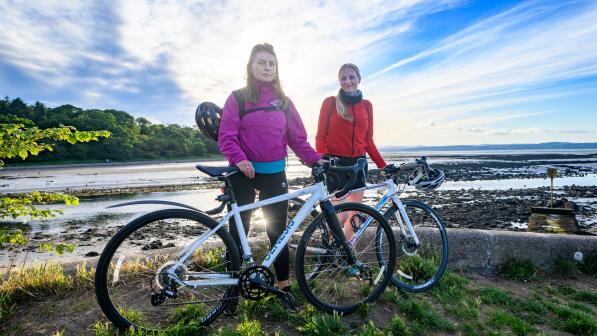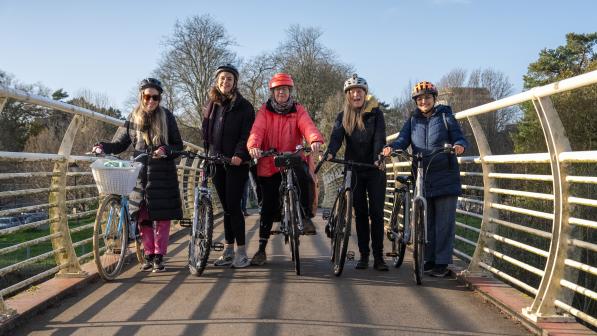My ride. Our right: Agustina, 49, Belfast

Agustina Martire, 49, a senior lecturer in architecture at Queen’s University, Belfast, has cycled since she was five, although there have been long breaks in between. Supporting our campaign, 'My ride. Our right’ she shares how we must normalise it being safe.
Agustina has always seen cycling as a convenient and affordable way to get around. She recalls that in Santiago de Chile, where she grew up, cycling around as a kid felt safe in the 1980s. When she later moved to Holland and Barcelona, she praised them as being places where cycling is “completely natural” and “part of everyday life”, with good integration with public transport.
In contrast, when she relocated to Dublin, she tried cycling but stopped after a couple of near-miss incidents that shook her.
Fast forward to today, Agustina now lives in Belfast, where she met her partner who “cycles everywhere”. She realised cycling was once again possible, although she admits “the infrastructure is horrendous.”
Gender disparity in cycling
Speaking out on the gender disparity in cycling, Agustina highlights big differences in her and her partner’s experiences of cycling. “We’ve gone through periods where we’re both cycling to work every single day, yet once a week I get some kind of encounter, being shouted at or close passed on purpose. My partner and his male friends simply don’t experience this,” she says.
“I’m part of the Belfast Cycle Campaign, and I’ve talked to the women in that group and we know it’s a shared experience. It’s kind of common knowledge,” she says.
What’s remarkable is that Agustina says she has faced hostility more when she’s cycled with her daughter, either on the back of Agustina’s bike or on a bike of her own. “It’s always from strangers,” she says. ”People often shout that I shouldn’t be on the road, but my partner is hardly ever shouted at.
She adds:
I try not to go on busy roads when I’m with her. Now that my daughter is on her own bike, we’re likely to cycle a lot less because I don’t want to put her in those situations. I would not put her on the road on her own bike, so when we cycle together, we always just take the river either north or south to the meadows.
“Drivers here don’t have the cultural thing of it yet. I could notice it in London – there’s a huge difference between cycling ten years ago and now.”
The worst experience she recounts was taking her daughter to ballet class on a Saturday morning, which left her “completely shaken.” With her daughter in a pink tutu in a child seat in front, they were chatting while carefully cycling through quiet neighbourhood roads. A car drove out of a school gate behind her, engine roaring, so fast and so close she could feel a gust of air moving her hair, at touching distance.
Agustina stopped to calm her nerves, and exclaimed “what are you doing?” – the driver then stopped the car in front and yelled back “what are you doing with a child on a bicycle?”
Though the incident rattled Agustina, she found a lot of peer support in a Belfast campaign group she’d joined called Streets for All. “The chat became a bit of a self-help group. Some of Agustina’s friends are also cycling less now their kids are older. “The main reason why we cycle less is because of the lack of separated cycling routes. That’s it. It’s not the weather, it’s not the cold, it’s not the hills, it’s not the helmets. It’s just mostly because there are no safe cycle lanes.”
Asked whether Agustina, as an architectural expert, thinks better infrastructure could also help reduce bad behaviour on our roads, she said: “Oh, completely. Look at Holland, Denmark, Barcelona and Paris. All of these cities made very drastic changes to their infrastructure. And now you have better air quality, less incidents and a healthier population. Holland has the lowest amount of casualties compared to kilometres cycled. Even though they have roads that you share with traffic, there’s more respect on the roads. I’m a firm believer in the research that says the first thing to do is the infrastructure, because it’s been tried and tested.”
We cannot normalise women driving so that they can be safe outdoors
Supporting our campaign 'My ride. Our right' Agustina is backing our call for better infrastructure that gives people the option to cycle for shorter journeys. “It’s important because the world is on fire, number one,” she said. “Number two, if people keep driving their cars for short journeys, they’re going to have really bad health. It’s a public health issue. We cannot normalise women driving so that they can be safe outdoors. Cycling is one of those things that normalises being safe outdoors. For me, those three things are really, really important in terms of having a world for our children.”
Another key reason for Agustina, and the main reason she keeps cycling even when she’s come across hostility, is that cycling is just so much fun. She thinks everyone should be able to enjoy it. “I miss it when I refrain from cycling because I think, oh, if I have to go to north Belfast, I better take a taxi because it’s dangerous. And then I miss on the fun and convenience and the joy it brings me. I love it.”


